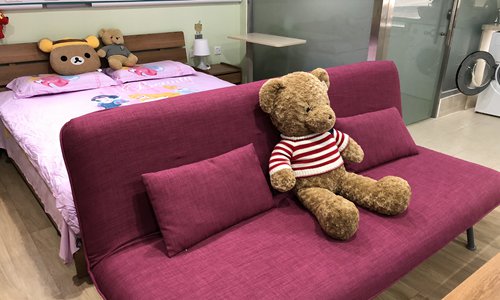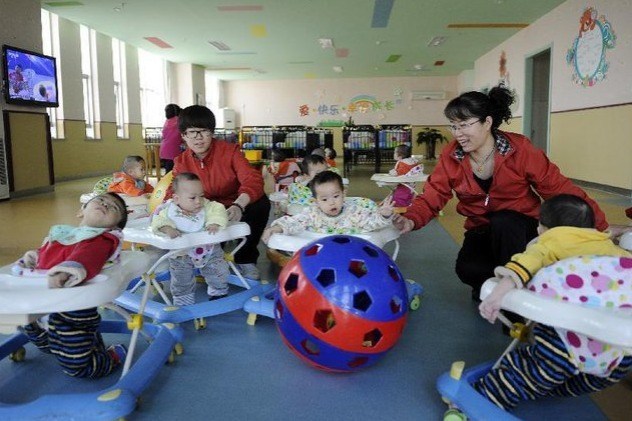
From the People's Daily app.
And this is Story in the Story.
In China, approximately 30,000 to 40,000 children are diagnosed with cancer every year, most commonly leukemia, lymphadenoma, and solid tumors.
There are children with late-period tumors who require hospice services, but the reality is that China has underdeveloped resources in this area and in related fields.
Fortunately, 80 percent of children with leukemia can be cured thanks to medical advances. However, the 20 percent who cannot be cured still face a significant shortfall in children hospice resources in China
Jointly established by the New Sunshine Charity Foundation and Beijing's Song Tang Hospice in 2017, Chuju Zhijia occupies three wards on the second floor of a building in the hospice.
Zhou Xuan, a founder of the hospice and a chief physician at the hematological oncology department of Beijing Children's Hospital, said that after seeing the pain these terminally ill children go through before death, she wanted to do something to ease it.
"We want to give these children a warm memory at the end of their lives," Zhou said.
Today’s Story in the Story looks at how a hospice in Beijing is providing cancer support for children and their families in a unique, home setting environment.

A cozy and home-like ward in Chuju Zhijia hospice (Photo: Global Times)
At the Song Tang Hospice, medical workers are on 24-hour standby, and volunteers come every day to play with the children.
Accommodation fees are paid by New Sunshine Charity Foundation Pediatric Palliative Care Special Fund and families that have checked in only pay medical expenses.
As children in hospice care do not require a great deal of examination and treatment, and Song Tang charges less than other hospitals, parents don't need to pay much in Chuju Zhijia, Zhou said.
A professional medical team is the most essential part of the operation.
The hospice currently has a 19-member medical team, and most of them are doctors and nurses from children's hospitals.
After medical care, the most critical aspect of this hospice is spiritual care.
"The priority is to control the symptoms, which have the biggest impact on their lives," Zhou said.
The wards previously contained eight beds but have now been adapted into a home-like setting with two rooms.
Through a white door are a living area with kitchen equipment and a dining table. In the bedroom, light green walls, a king-sized bed and cartoon decorations turn the ward into a warm and cozy space.
"Those children who die in ICUs were so lonely when they left the world without relatives around, which also hurts the parents," said Zhou.
The hospice aims to provide a home environment. The king-sized bed is designed for parents and children, and a well-equipped kitchen allows parents to cook the children's favorite food, Zhou explained.
With the children the priority is pain relief. "As long as the children feel comfortable, parents will feel better," she said.
"Comforting families is the most difficult part," Zhou said, and added, "we are trying to minimize the pain of losing their children."

(Photo: agencies)
Zhou said that there is no formula to follow in terms of how to ease the suffering of parents.
"They go through very complex emotions such as sadness, anger, and fear when they see their children in such pain," Zhou explained, emphasizing, "Some families fall apart after their child's death."
Experienced and licensed social workers are available to provide families psychological support to relieve their grief as much as possible or help them get through this devastating period with some peace of mind.
"The key is constant communication," Zhou explained. When facing a child's death, most parents also feel regret that they have failed the child and ask themselves if there was anything they could have done to keep their child alive. Some parents simply refuse to accept the reality that their child is dying.
"We will tell them the truth on the premise of controlling their child's pain and tell them that whatever you do to make your child comfortable is the right thing to do," said Zhou. "They will eventually accept the reality when they see their child is weak, in peace, and free from pain," she said.
When the child has just a day or two left to live, parents can even talk calmly about what clothes and memorial they will prepare.
Zhou is planning to add more wards to Chuju Zhijia, giving more sick children a respite from their suffering at the end of their lives. She believes that hospice service levels are directly connected to social, economic, and medical development.
"I think it's the overall development of a society that allows people to pay more attention to their dignity," she said.
(Produced by Nancy Yan Xu, Lance Crayon, Brian Lowe and Paris Yelu Xu. Music by: bensound.com. Text from Global Times and China Daily.)


